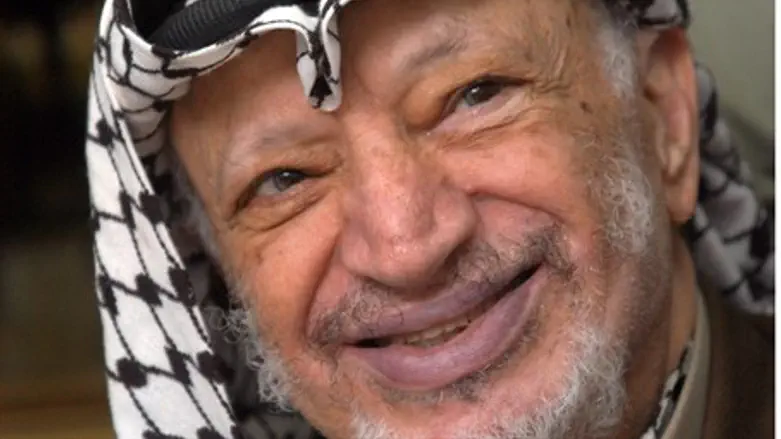
Palestinian Authority officials have demanded a global probe into the "killing" of Yasser Arafat on Thursday, along similar lines to the international criminal probe into the assassination of former Lebanese Prime Minister Rafiq Hariri.
The calls come a day after it emerged that Swiss forensic tests showed he probably died from polonium poisoning, and hours before a scheduled press conference will see investigators publicly discuss their findings for the first time.
With the scientific analysis purportedly showing how the former PA Chairman had died mysteriously, a senior figure in the Palestine Liberation Organisation (PLO) called for an international inquiry to determine who was behind it.
"The (test) results proved Arafat was poisoned by polonium, and this substance is owned by states, not people, meaning that the crime was committed by a state," said Wasel Abu Yusef of the PLO's executive committee.
"Just as a committee was formed to investigate the killing of Rafiq Hariri, there must be a international committee to investigate the killing of president Arafat."
His remarks came a day after Al-Jazeera published a report by Swiss scientists that said the results of tests on Arafat's remains "moderately support the proposition that the death was the consequence of poisoning with polonium-210".
Arafat died in France on November 11, 2004 at the age of 75, but doctors were unable to specify the cause of death. No autopsy was carried out at the time, in line with his widow Suha's request.
Officials from Mahmoud Abbas' Fatah, which dominates both the PLO and the Palestinian Authority, were scheduled to meet at 1100 GMT to discuss the findings, a senior party member told AFP.
Tawfiq Tirawi, head of the PA committee for investigating Arafat's death, was to hold a news conference on Friday morning to discuss the Swiss findings, officials said.
Meanwhile in Lausanne, the Swiss team which carried out the analysis was preparing to hold its own press conference at 12:45 GMT to expound on their report.
Patrice Mangin and Francois Bochud "will answer questions linked to the expert report handed Tuesday to representatives for Mrs Suha Arafat and the Palestinian National Authority," a statement said.
In an interview with Al-Jazeera on Wednesday, Suha charged that the poisoning amounted to "the assassination of a great leader" and a "political crime".
Suha had initially opposed an autopsy on her ex-husband's remains, but Arafat's body was exhumed in November 2012 and samples taken, partly to investigate whether he had been poisoned - an allegation made after the assassination of Russian ex-spy and Kremlin critic Alexander Litvinenko in London in 2006.
'Soap opera'
"New toxicological and radio-toxicological investigations were performed, demonstrating unexpectedly high levels of polonium-210 and lead-210 activity in many of the analysed specimens," according to the November 5 report by 10 Swiss experts quoted by Al-Jazeera.
It said polonium levels in "bones and soft tissues were up to 20 times larger than references in the literature", firmly ruling out the possibility previously reported in some media that cigarette smoke had caused greater than normal polonium levels among Arafat's personal effects.
Following Arafat's sudden demise and death, rumors exploded across the PA political spectrum that Israel was responsible, a charge Israeli officials have repeatedly rejected.
Israel's foreign ministry on Wednesday scoffed at the notion that Arafat had been poisoned, describing the matters as a long-running "soap opera" and suggesting the various investigations were not impartial.
"This is more soap opera than science," said Israeli foreign ministry spokesman Yigal Palmor yesterday in an interview with the BBC.
Palmor said the investigations had been commissioned by "interested parties" such as Arafat's widow and the Palestinian Authority, and had "never bothered" to look for some key data.
"The other huge hole in the theory is the absence of all access to the French hospital where Arafat died and to Arafat's medical files," Palmor noted.
"How can the cause of death be determined without the opinion of the doctors or the results of the medical tests they ran on the patient?" he asked, continuing to say that "Israel doesn't feel concerned in the least" over allegations it was responsible for Arafat's death.
On Thursday a top aide to former Israeli prime minister Ariel Sharon, who was in power when Arafat died, insisted the premier had done everything to prevent any harm to the PA leader.
"Ariel Sharon insisted that everything be done to ensure that Arafat, who was at the time living inside his besieged Muqataa compound, was not killed by our soldiers," Raanan Gissin told AFP.
"His instructions were to take every precaution to avoid Israel being accused of Arafat's death.
"Instead of launching baseless accusations against Israel, the Palestinians would be better to question those in Arafat's entourage who had an interest in his death and above all getting their hands on the money he controlled," said Gissin.
Yasser Arafat was long suspected of having embezzled millions of dollars of foreign aid, and an ongoing saga surrounding accusations of corruption within the PA has been the source for considerable infightingt.
The PA received the Swiss report on November 2, Tirawi told AFP, and the official WAFA news agency said a separate Russian team appointed by the Palestinian Authority also handed in its report on the same day.
Some 60 samples were taken from Arafat's remains in November last year and were divided between the Swiss and Russian investigators and a French team carrying out a probe at his widow's request.
Last month, The Lancet medical journal said Swiss scientists had found traces of polonium in separate tests on Arafat's clothing which "support the possibility" he was poisoned.